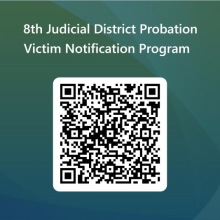There are numerous law enforcement agencies throughout Larimer County. For the sake of this site, we have focused on the Larimer County Sheriff's Office and their victim services. If another law enforcement responded to your crime, you can find the other agencies websites and contact numbers below.
 The Larimer County Sheriff's Office Victim Response Team (VRT) was established in 1994 to provide services for victims. The Victim Response Team provides assistance to victims 24 hours, 7 days a week, 365 days a year. In addition to the support provided victims, one of the main goals of the victim response team is to inform victims of the legal rights afforded them under title 24 in the Colorado Statutes. The Victim Response Team assures that victims are aware of their legal rights by providing and explaining a victim rights pamphlet.
The Larimer County Sheriff's Office Victim Response Team (VRT) was established in 1994 to provide services for victims. The Victim Response Team provides assistance to victims 24 hours, 7 days a week, 365 days a year. In addition to the support provided victims, one of the main goals of the victim response team is to inform victims of the legal rights afforded them under title 24 in the Colorado Statutes. The Victim Response Team assures that victims are aware of their legal rights by providing and explaining a victim rights pamphlet.
The Victim Response Team also responds and provides assistance in situations including suicide, unattended deaths, family problems, floods, fires, missing persons, death notifications, and critical incidents.
SERVICES PROVIDED CAN INCLUDE:
- On-scene assistance
- Emotional Support
- Referrals to local resources
- Crime Victim Compensation (CVC) provides financial assistance to eligible crime victims to lessen the financial burden placed upon them as a result of a crime.
- Assistance with bond hearings
CONTACT INFORMATION
Address: 2501 Midpoint Drive, Fort Collins, CO 80525
Website: www.larimer.gov/sheriff/investigations/victim-response-team
Email: sheriff-victims-response@co.larimer.co.us
Phone: (970) 498-5149
OTHER LAW ENFORCEMENT AGENCIES
- City of Fort Collins Police Department, www.fcgov.com/police, Non-Emergency Number: (970) 419-3273
- City of Loveland Police Department, www.lovgov.org/services/police, Non-Emergency Number: (970) 667-2151
- Colorado State Patrol, csp.colorado.gov/services-we-provide/victim-rights, Non-Emergency Number: (303) 239-4501
- Colorado State University Police, police.colostate.edu, (970) 491-6425
- Town of Estes Park Police, estespark.colorado.gov/pd, Non-Emergency Number: (970) 586-4000
- Town of Johnstown Police, Johnstownco.gov/228/Police, Non-Emergency Number: (970) 587-5555
- Town of Timnath Police, https://timnath.org/public-safety/, Non-Emergency Number: (970) 224-3224
- Town of Windsor Police, www.windsorpd.com, Non-Emergency Number: (970) 674-6400

The Victim/Witness Division provides services to victims of, and witnesses to, crime throughout their involvement with the community justice process in an informative, supportive manner that enables them to be involved and provide input into the process, and which empowers them to recover from criminal events. Once a case is filed with the District Attorney's Office and throughout the court process, you'll be assigned a Victim Witness Specialist (victim advocate) from the District Attorney's Office.
SERVICES PROVIDED CAN INCLUDE:
- The Victim Witness Division will notify you of various critical events throughout the court process. Some examples of critical events are:
- Disposition Hearing
- Sentencing Hearing
- Modification of Bond
- Trial
- Hearing on a Modification of a No Contact Order
- The Victim Witness Specialist's job is to help you understand what is happening in the case, as well as to refer you to resources within the community to help meet your needs during this time.
- Crime Victim Compensation (CVC) provides financial assistance to eligible crime victims to lessen the financial burden placed upon them as a result of a crime.
- Restitution is the repayment of financial losses to crime victims paid by the defendant as ordered by the court.
- Discovery: Requests for discovery will be forwarded to the Deputy District Attorney for review. The individual making the request will be contacted within 7 to 10 business days informing them of the outcome of the request. Victims will not be charged for discovery. To make a discovery request, complete the following form: https://www.larimer.gov/da/discovery/request-form
- Specialists assigned to cases communicate with victims in a number of ways: in person, by phone, or by mail/email.
CONTACT INFORMATION
Address: 201 LaPorte Avenue, Suite 200, Fort Collins, CO 80521
Website: www.larimer.gov/da/vicwit
Phone: (970) 498-7200

Our program coordinates services for victims of CJA-supervised offenders. One of the most common services is notification of client status/critical stage changes for victims whose offenders are sentenced to the Alternative Sentencing Department, Work Release, Work-Enders, Mid-Weekers and Electronic Home Detention, or Community Corrections. Victim Services will also facilitate opportunities for victims to provide input to the screening process for offenders considered for acceptance into Community Corrections. Our Victim Services program provides crisis counseling, support, advocacy and information to victims, as well as any needed referrals for outside services.
SCREENING PROVIDED FOR COMMUNITY CORRECTIONS:
- Give the victim the ability to provide input.
SERVICES PROVIDED CAN INCLUDE:
- Crime Victim Compensation (CVC) provides financial assistance to eligible crime victims to lessen the financial burden placed upon them as a result of a crime.
- Notifications about any of the following post-sentencing events:
- Arrival and projected release date
- Notice of escape and recapture
- Release or discharge from confinement
- Transfer to community supervision
- Termination and transfer of custody
- Reconsideration or modification of sentence
- Petition to cease sex offender registration
- Filing of a complaint, summons, or warrant
- Change of venue or transfer of supervision
- Early termination
- Notification of Warrants
- Death
CONTACT INFORMATION:
Address: 2307 Midpoint Drive, Fort Collins, CO 80521
Website: https://www.larimer.gov/cja/victim-services
Community Corrections Phone: (970) 498-7503
Alternative Sentencing Phone: (970) 980-2698
Email: cjsd-vsu@co.larimer.co.us

If you are the victim or a parent/guardian of a minor victim in a case where the defendant has been sentenced to probation, you may be able to receive notices of the important stages of supervision. Victim services are offered in line with the Colorado Victim Rights Amendment. Victims of specified crimes are informed of the defendant's sentence to probation and are invited to sign-up for notifications of important events or changes during probation supervision.
Victims who choose to receive notification will be contacted by probation and provided the following information. As laws frequently change, this list should not be considered exhaustive. For the most current list of all notifications, please reference §24-4.1-303(13.5), C.R.S
- Location and phone number of the department supervising the probationer
- Date of probation supervision termination
- Any request for release of the person in advance of the imposed sentence or period of probation, including the victim’s right to be present and heard at the hearing and notification of the results of the hearing. If the court is considering granting the request without a hearing, the victim has the right to be notified and to provide input
- Any probation revocation or modification hearing, where the sentence may be reconsidered or modified or any changes in the scheduling of hearings, including the victim’s right to be present and heard and to be notified of the court’s ruling. If the court is considering granting the motion without a hearing, the victim has the right to be notified and give input
- Any motion filed by probation requesting permission to modify the terms and conditions, unless the motion is denied without a hearing
- Any change of venue or transfer of supervision from one jurisdiction to another or interstate compact transfer
- Any complaint, summons, or warrant filed by probation for failure to report to probation or because the location of a person convicted of a crime is unknown
- The death of the person while on probation
- In domestic violence cases only, any conduct by the probationer that results in an increase in the supervision level
- Any court-ordered modification of the terms and conditions of probation
- Absconding from probation
To enroll in probation notifications, please scan the QR code below, or contact the Probation office to request enrollment. You will not be notified if you do not enroll, unless the offender absconds from probation.
CONTACT INFORMATION:
Address: 1600 Prospect Park Way Ste 109, Fort Collins, CO 80525
Phone: (970) 494-3901
As a victim (or in some instances, a member of the victim’s family), your rights are guaranteed by the Colorado Constitution. Too often, people feel victimized by the criminal defendant and the legal system. Assisting you in understanding your rights and helping you exercise these rights is a top priority.
In 1992, Colorado voters passed an amendment to the Colorado Constitution giving victims of violent crime specific rights within the community justice system. The Legislative declaration of the Victim Rights Act (C.R.S. 24-4.1-301) states:
The general assembly hereby finds and declares that the full and voluntary cooperation of victims of and witnesses to crimes with state and local law enforcement agencies as to such crimes is imperative for the general effectiveness and well-being of the community justice system of this state. It is the intent of this part 3, therefore, to assure that all victims of and witnesses to crimes are honored and protected by law enforcement agencies, prosecutors, and judges in a manner no less vigorous than the protection afforded criminal defendants.
COLORADO REVISED STATUTES & OTHER VICTIM RIGHTS RESOURCES
If you are threatened or intimidated because you are a victim or witness in a case, call the police or Sheriff's Department immediately.
Mandatory Protection Order
It is critical that victims and witnesses are protected. In criminal cases, a mandatory protection order will be issued by the court at the defendant's first appearance (Colorado Revised Statues Section 18-1-1001). This mandatory protection order restrains a person from harassing, molesting, intimidating, retaliating against, or tampering with any witness or victim of a crime. The order remains in effect until the final disposition of the case, completion of sentence or acquittal.
No Contact Order
A no contact order is a condition that may be included on a mandatory protection order in cases involving domestic violence and certain cases involving crimes against persons, such as sexual assault, physical assault, child abuse (including physical and sexual abuse) and crimes against at-risk-adults. The defendant may be required to comply with provision such as:
- No direct or indirect contact with the victim;
- To stay away from victim's home or any other location where the victim or witness is likely to be found;
- Shall vacate the residence;
- Will not possess firearms or other weapons;
- Will not possess or consume alcohol or controlled substances; and
- Any other order the court thinks is appropriate to protect the safety of the victim.
If you have questions regarding the no contact order, or whether there is a no contact order in your case, you can contact the Victim/Witness Division at (970) 498-7285 or the victim/witness specialist assigned to the case.
Civil Protection Order
A civil protection order, commonly referred to as a restraining order, may be requested from the court in a separate civil action. View instructions from the Colorado Courts on filing for a civil protection order.
The Eighth Judicial District Self Help Center located in the Larimer County Justice Center is available to assist self-represented parties involved in legal proceedings. Learn more about the Eighth Judicial Self Help Center, and how the center may be able to help you.
If you believe you are in immediate danger, please call 9-1-1.
For additional Victim Resources & Links, please click here.
 The Larimer County Sheriff's Office Victim Response Team (VRT) was established in 1994 to provide services for victims. The Victim Response Team provides assistance to victims 24 hours, 7 days a week, 365 days a year. In addition to the support provided victims, one of the main goals of the victim response team is to inform victims of the legal rights afforded them under title 24 in the Colorado Statutes. The Victim Response Team assures that victims are aware of their legal rights by providing and explaining a victim rights pamphlet.
The Larimer County Sheriff's Office Victim Response Team (VRT) was established in 1994 to provide services for victims. The Victim Response Team provides assistance to victims 24 hours, 7 days a week, 365 days a year. In addition to the support provided victims, one of the main goals of the victim response team is to inform victims of the legal rights afforded them under title 24 in the Colorado Statutes. The Victim Response Team assures that victims are aware of their legal rights by providing and explaining a victim rights pamphlet.




